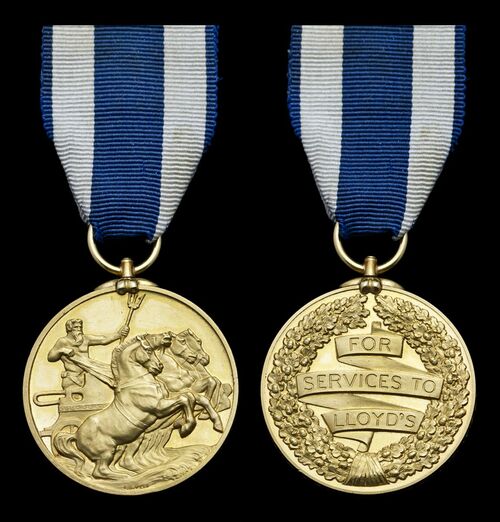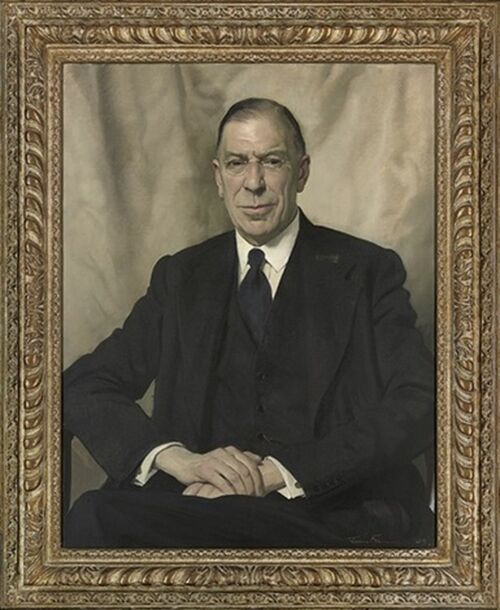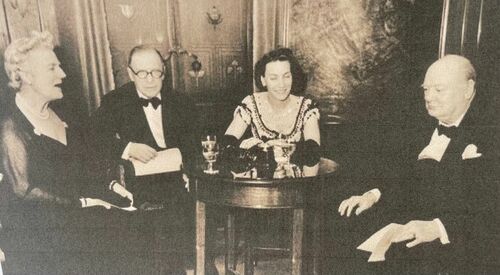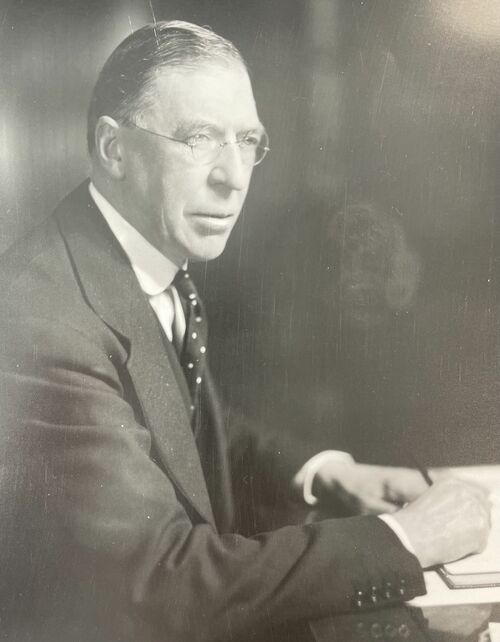Auction: 24002 - Orders, Decorations and Medals
Lot: 249
The very rare 1932 Lloyd's Gold Medal for Distinguished Services awarded to Sir E. R. Pulbrook, Chairman of Lloyd's during the Second World War, a period which saw him become the first Lloyd's Chairman to travel overseas on business for the first time in over a century in order to broker important agreements with the United States Government
Lloyd's Gold Medal for Distinguished Services (Eustace Ralph Pulbrook, 1932), gold, 36mm, in its fitted case, the lid blocked 'Presented to Eustace Ralph Pulbrook at the General Meeting on the 8th June 1932, by the Members of the Corporation of Lloyd's to Commemorate his many Distinguished Services to Lloyd's. Chairman of Lloyd's 1926. Deputy-Chairman of Lloyd's 1925.', lid detached but present, one small edge bruise otherwise nearly extremely fine
Weight - 84.04g.
Tests as .999 fine gold.
Awarded just 17 times since its inception in 1919, the last award being to Robert Hiscox in 2013.
Eustace Ralph Pulbrook was born on 20 September 1881 and was educated at Dulwich College, before joining Lloyd's of London in 1899. By 1921 he had been elected to the Committee and was raised to become Deputy-Chairman in 1925 and Chairman the following year, the youngest person in history to hold that office. He would hold the office in 1929, 1940-46 & 1948. Besides this, he served the Committee for some three decades, to begin with taking the subscribed break of one year in every five. During the Second World War, however, a special By-Law was raised in order that he remain for three terms.
During the Second World War he became the first Lloyd's Chairman to travel overseas in over a century on business. In October 1942 he went to New York with Philip D'Ambrumenil to meet the American authorities, who were worried that Britain would soon be invaded. Having entered the War, the officials were concerned of the risk to intelligence regarding ships' movements from US brokers to Lloyd's. Initially blocking any insurance order being sent abroad, it meant the flow of business stopped entirely for a period and thus, it fell to Pulbrook to calm the fears, which was achieved. As a result a deal was struck in which Lloyd's established an office in New York, which was to store all vital information there, whilst anything non-classified would be cabled over to London. The London broker was thence left unaware of what they were actually insuring but relied implicitly on their counterparts in New York running 'a tight ship'. The deal ensured that Lloyd's was still the broker who insured the world during the Second World War (The Last Ditch - Britain's Secret Resistance & The Nazi Invasion Plans, David Lampe refers).
Pulbrook also sponsored a child who had managed to leave Nazi Germany via the Kindertransport, Paul Kuttner. Having just watched a movie on what was D-Day, 6 June 1944, near Camden Town, Kuttner managed to find himself arrested and taken to Scotland Yard. Given he was scribbling into an old German diary, he was suspected of being a spy and interrogated. He recalls:
'Suddenly I remembered my sponsor and good friend in England since February 1939, the Chairman of Lloyd's of London, Sir Eustace Pullbrook. This put a sudden break on their cross-examination of me. One of the Scotland Yard men had heard of Sir Eustace. I gave the detectives the Chairman's private telephone number and in my presence they called him around midnight, explaining the Kuttner-case to him in a few words and then heard a mouthful, a virtual tirade, from one of the top businessmen of the British Empire.
You could see the Scotland Yard man on the phone cringe listening to Sir Eustace's stream of abuse after a few minutes the detective apologised for waking him and promised to release me immediately. He hung-up, told me not to make any more notes in my old German diary and said I could go.
I explained to him that if I was stopped by a Policeman on the street at that late hour as an 'enemy alien' I would be arrested again. Both the Scotland Yard man and police captain agreed with me and said they would take me home in their cars.'
Pulbrook added the Knighthood (London Gazette 2 June 1943, refers) and was bestowed the 2nd Class Order of Orange Nassau from the Netherlands (London Gazette 30 January 1948, refers) for his services during the Second World War. Churchill was elected by Lloyd's to be an Honorary Member (only the fifth to be so honoured after Marconi, Admiral Beatty, Lord Haigh & Admiral Sturdee) in 1944. Given how busy Churchill was, it was not until 1948 that he and Lady Churchill attended a dinner in the Captain's Room, hosted by Pulbrook.
A member of the City of London and Buck's Club and a keen golfer, Pulbrook had one son and a daughter from his first wife Dorothy, who died in 1942. He died in 1953. His second wife, Lady Pulbrook, established the famous florists Pulbrook & Gould.
Subject to 20% VAT on Buyer’s Premium. For more information please view Terms and Conditions for Buyers.
Sold for
£6,000
Starting price
£2800











